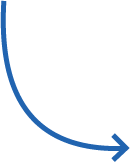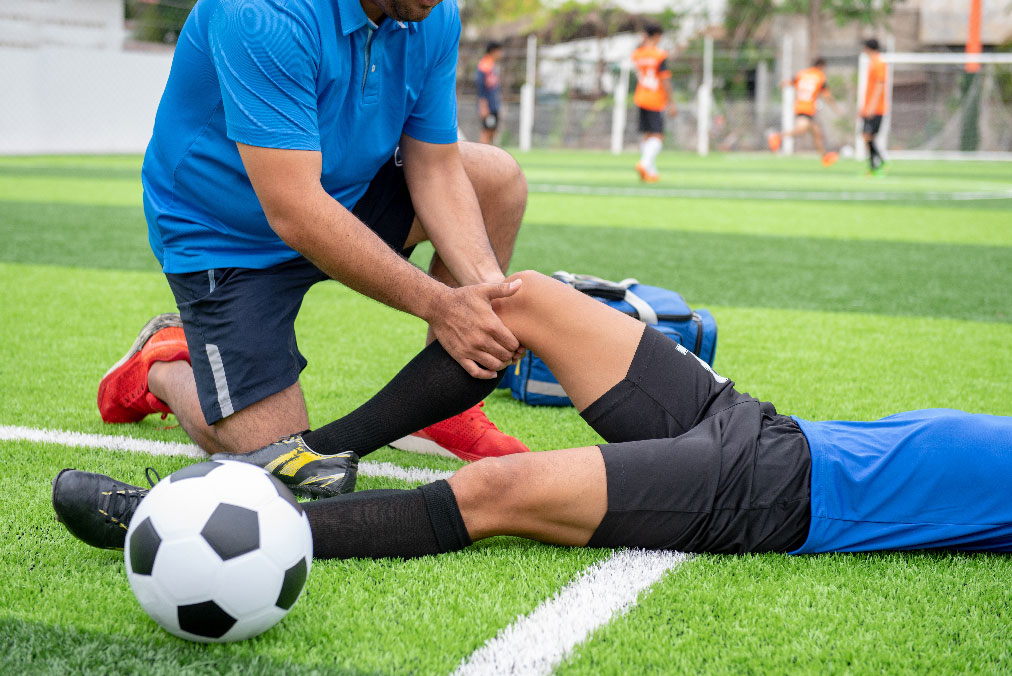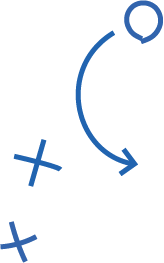WHAT IS ATHLETIC THERAPY?
What is Athletic Therapy

ATHLETIC THERAPY IN BC
Ever wondered how a hockey player can tear an ACL and return to the ice so quickly? While professional athletes are in great physical condition, they are also supported by medical professionals that provide efficient sports injury treatments – including athletic therapy.
Athletic therapy is a healthcare profession that focuses on the treatment, prevention, assessment, and active rehabilitation of musculoskeletal (muscle, bones, and joints) injuries. But don’t let the name fool you, we don’t just deal in sports injuries. Athletic therapists treat a wide range of patients, from kids with concussions to seniors recovering from hip replacement surgery.
-

01.
IN THE FIELD
Athletic Therapists are best known for being the first responders on the field. We provide the care athletes need when they’re injured in action and the rehabilitation and assessment needed to get them back into the game.
-

02.
IN THE CLINIC
An Athletic Therapist can help anyone, from the elite athlete to the everyday runner. Athletic Therapists work in public and private medical clinics treating a variety of sports injuries and chronic pain – helping people from all walks of life get back into the activities they love.
Have a Sports Injury?
FIND A CERTIFIED ATHLETIC THERAPIST NEAR YOU

Required Skills of Certified Athletic Therapists
SCOPE OF PRACTICE
Certified Athletic therapists can help anyone get back on their feet with a traditional blend of manual therapy and exercise-based rehabilitation. The scope of practice of an Athletic Therapist starts with an in-depth knowledge of the human musculoskeletal system, exercise physiology, biomechanics, and basic emergency care.
Within this, the Athletic Therapy scope of practice is divided into five domains. These five core components are the skills and roles required to become an entry level Athletic Therapist.
-
- Athletic Therapists provide instruction to individuals on the use of commercially made or custom-made protective equipment to minimize the risk of injury, illness or health related conditions.
- Athletic Therapists provide custom-made devices or properly apply commercially made products in order to provide prophylactic/protective measures that minimize the risk of injury, illness or health related conditions.
- Athletic Therapists educate their patients on the risks and corrective actions associated with participation in fitness and sport programs, workplace ergonomics, and musculoskeletal injury prevention in both active lifestyle and workplace settings.
- Athletic Therapists facilitate physical conditioning by designing and implementing programs to reduce the risk of injury, illness or health-related conditions.
-
- Athletic Therapists formulate a diagnosis by interpreting the mechanism of injury; determining signs, symptoms and predisposing factors of an injury, illness or health related condition; and performing specific physical, orthopedic or fitness testing in accordance with accepted procedures to assess an injury, illness and/or health related condition.
- Athletic Therapists assess for/recognize the potential of a sport-related traumatic brain injury/concussion.
- An Athletic Therapist assesses the biomechanical impact of injury, illness, or health-related condition to promote ergonomically correct functioning of the body.
- An Athletic Therapist reassesses the status of injuries, illnesses and/or health-related conditions using standard techniques and documentation to determine appropriate treatment, rehabilitation and/or fitness and reconditioning plans.
- Athletic Therapists formulate a diagnosis by interpreting the mechanism of injury; determining signs, symptoms and predisposing factors of an injury, illness or health related condition; and performing specific physical, orthopedic or fitness testing in accordance with accepted procedures to assess an injury, illness and/or health related condition.
-
- Athletic Therapists employ life-saving techniques through the use of standard emergency procedures to reduce the incidence of morbidity and mortality.
- An Athletic Therapist prevents the exacerbation of non-life-threatening conditions through the use of standard procedures to reduce morbidity.
- Athletic Therapists engage in rehabilitative therapy (including electrical, thermal and mechanical modalities) using standard athletic therapy techniques and procedures to facilitate recovery, function and/or performance.
- Athletic Therapists administer therapeutic and conditioning exercise(s) using both standard and advanced techniques and procedures to facilitate recovery, function and/or performance either pre- or post-injury or surgical intervention, as well as for general illnesses or conditions related to the musculoskeletal system.
- An Athletic Therapist educates and provides guidance and/or counseling to patients and individuals in the treatment, rehabilitation and reconditioning of injuries, illnesses and/or health-related conditions to facilitate recovery, function and/or performance.
- An Athletic Therapist educates, provides guidance and/or counseling for, and administers appropriate return protocols for patients returning from sport related traumatic brain injuries.
- Athletic Therapists employ life-saving techniques through the use of standard emergency procedures to reduce the incidence of morbidity and mortality.
-
- Athletic Therapists use an information management system to maintain appropriate medical records/documentation that comply with accepted best practice guidelines.
-
- An Athletic Therapist adheres to policies and procedures for the delivery of healthcare services following accepted guidelines to promote safe participation, timely care and legal compliance
- Athletic Therapists maintain records using a system to document professional services rendered to provide quality healthcare services.
- An Athletic Therapist adheres to the statutory and regulatory provisions for the practice of Athletic Therapy by maintaining an understanding of these provisions and responsibilities in order to contribute to the safety and welfare of the public.
Interested in being an Athletic Therapist in BC?
HOW TO BECOME AN ATHLETIC THERAPIST
To become a certified Athletic Therapist in BC, you must complete a Bachelor’s degree, graduate from one of the eight CATA accredited institutions in Canada, participate in on-field and in-clinic practical training, hold a valid first responder certificate, and pass the National Certification Examination.
After certification, Athletic Therapists are required to stay up to date with the current trends in Athletic Therapy by participating in professional development. In order to maintain certification, you must achieve 21 continuing education credits every 3 years and hold a valid basic life support certificate.
FREQUENTLY ASKED QUESTIONS
In order to work as an Athletic Therapist in BC, or Canada, you will need to be certified by CATA and a member of your provincial Athletic Therapy Association. Visit the CATA site to learn more about the certification process.
The main difference between physiotherapy and athletic therapy is the parts of the body that each profession focuses on. Athletic Therapy focuses on musculoskeletal injuries and on-field emergencies, while physiotherapy may also include cardiovascular and even neurological health issues that can affect your movement. Both professions focus on injury prevention, treatment, and rehabilitation as well as maintaining a high standard of professional conduct.
Athletic Therapists work in many different sports medicine settings including:
• In Universities and colleges with varsity athletes, providing expertise on injury prevention, emergency and acute care, assessment, and rehabilitation.
• With Professional Sports teams and dance companies as part of their ongoing care and treatment.
• With National Athletes as a part of their ongoing care and as a part of their medical team during competing events such as the Olympics, Pan Am, Universiade, Commonwealth, Canada Games, etc.
• In Private Sports Medicine Clinics treating a variety of injuries and conditions for all active Canadians.
• In high school amateur and varsity athletics as a part of the team’s on-site emergency and ongoing sports injury treatments.
• In municipal government and industrial workplaces to teach healthy injury prevention practices.
There are 8 schools with CATA accredited athletic therapy programs in Canada that prepare students for working in the Athletic Therapy Profession.
Acadia University
Dr. Colin King
School of Kinesiology
550 Main St. Wolfville, NS B4P 2R6
Tel. (902) 585-1309
Email: colin.king@acadiau.ca
Website: https://kinesiology.acadiau.ca/degree-options.html
Camosun College
Ms. Isabel Grondin
Centre for Sport and Exercise Education
4371 Interurban Road Victoria, British Columbia V9E 2C5
Tel. (250) 370-4728 Fax (250) 220-2501
Email: GrondinI@camosun.ca
Website: camosun.bc.ca
Concordia University
Ms. Jacqueline Camley
Department of Exercise Science
7141 Sherbrooke St. W. Montreal, Quebec H4B 1R6
Tel. (514) 848-2424 ext 7936 Fax (514) 848-8681
Email: jacqueline.camley@concordia.ca
Website: https://www.concordia.ca/
Mount Royal University
Dr. Mark Lafave
4825 Richard Rd. S.W. Calgary, Alberta T3E 6K6
Tel. (403) 440-6500
Email: hpedadvising@mtroyal.ca
Website: mtroyal.ca
Sheridan College
Ms. Kirsty McKenzie
7899 McLaughlin Road Brampton, Ontario L6V 1G6
Tel. (905) 459-7533 ext. 5253 Fax (905) 815-4043
Email: kirsty.mckenzie@sheridancollege.ca
Website: sheridancollege.ca/programs/bachelor-of-applied-health-sciences-athletic-therapy
Université du Québec à Trois-Rivières
Dr. Philippe Fait
Directeur de programme, concentration thérapie du sport
Département des sciences de l’activité physique
Université du Québec à Trois-Rivières
3351 Boulevard des Forges, Trois-Rivières, QC G9A 5H7
Téléphone : 819 376-5011 Sans frais : 1 800 365-0922
Email : philippe.fait@uqtr.ca
Website : uqtr.ca
University of Manitoba
Ms. Jacqueline Elliott
102 Frank Kennedy Centre Winnipeg, Manitoba R3T 2N2
Tel. (204) 474-9143 Fax (204) 474-7634
Email: Jacqueline.elliott@umanitoba.ca
Website: umanitoba.ca
University of Winnipeg
Glen Bergeron PhD CAT(C)
515 Portage Avenue Winnipeg, Manitoba R3B 2E9
Tel. (204) 786-9190 Fax (204) 783-7866
Email: g.bergeron@uwinnipeg.ca
Website: uwinnipeg.ca/dept-kinesiology/degrees/4-yr-bsc-athletictherapy.html
York University
Dr. Loriann Hynes
School of Kinesiology and Health Science
324 Stong College 4700 Keele Street North York, Ontario M3J 1P3
Tel. (416) 736-2100 ext. 22734 Fax (416) 736-5996
Email: lhynes@yorku.ca
Website: yorku.ca
This program is accredited for the following entry methods only: Athletic Therapy Certificate embedded as a major within a four-year York University Kinesiology degree
For further information regarding CATA accredited institutions or to apply for accreditation, please contact:
Pete Dewar, Director of Operations
Canadian Athletic Therapists Association
#300, 400 5th Avenue S.W. Calgary, Alberta T2P 0L6
Tel. (403) 509-2282 OR 888-509-(CATA) 2282
Email: pete@athletictherapy.org
The Canadian Athletic Therapists Association is the certifying and governing body of athletic therapists working in Canada. ATABC works under CATA to provide governance, certification, and resources specific to Athletic Therapists working in BC.
In Canada, Athletic Therapists first join their provincial/regional athletic therapist organization and then join the CATA nationally. In order to be a certified Athletic Therapist in BC, you must be a member of both ATABC and CATA.